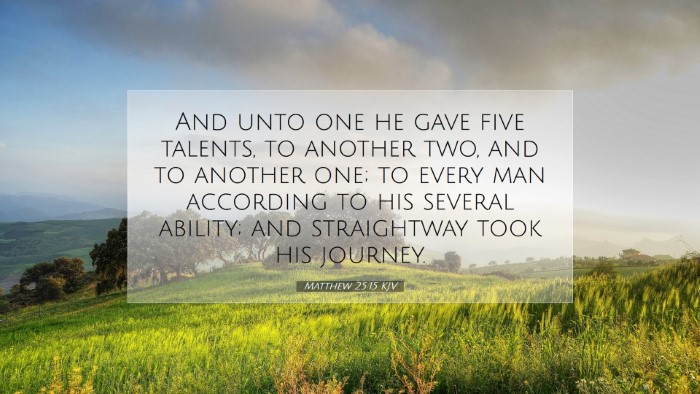Commentary on Matthew 25:15
Verse Context:
In Matthew 25:15, Jesus delivers a parable commonly known as the Parable of the Talents. This parable illustrates the principle of stewardship and the responsibility each servant has with what has been entrusted to them. The verse states, “And unto one he gave five talents, to another two, and to another one; to every man according to his several ability; and straightway took his journey.”
Analysis and Commentary
Divine Distribution of Gifts
This verse introduces a fundamental concept of God’s divine distribution. The phrase "according to his several ability" suggests that the Lord knows the capabilities and potential of each individual servant. Matthew Henry emphasizes that God does not give talents indiscriminately but rather considers the unique gifts and strengths of His servants, highlighting the theme of individual responsibility.
Albert Barnes elaborates on this by noting that the varying amounts given to each servant are not to be seen as expressions of favoritism but instead as accurate assessments of their capabilities. This perspective reinforces the idea that God's gifts are tailored for His purposes and each believer's unique calling.
The Significance of the Talents
The "talents" mentioned are often interpreted as not merely financial resources but also encompass various gifts, abilities, and opportunities God provides. Adam Clarke notes that the term “talent” was a significant sum of money in biblical times, which can also be seen symbolically as representing spiritual gifts or responsibilities assigned to each believer.
The emphasis on different amounts serves as a reminder that while some may receive more gifts or responsibilities, the expectation remains the same: faithfulness in stewardship. This point underscores the importance of utilizing whatever has been entrusted to each of us for the glory of God.
Character of the Servants
This verse presents a vivid portrayal of the servants’ diverse capabilities and roles. The diversity of their talents signifies the multifaceted nature of God’s work. As Matthew Henry articulates, the servants are each given what they can manage, demonstrating God's trust in them which further obligates them to act wisely with their endowments.
From this perspective, all servants, regardless of the degree of resourcefulness, carry the weight of responsibility. This calls for self-examination among believers regarding how they receive God’s gifts and whether they acknowledge their potential to bear fruit (John 15:16).
Time of Accountability
The phrase “and straightway took his journey” indicates that the master will return to assess how the servants have utilized their assigned talents. Albert Barnes highlights that the delay reflects an opportunity for each servant to demonstrate their diligence; thus, it is crucial for them to prepare for the Master’s return by being proactive and industrious in their labors.
This impending accountability serves as a sober reminder for believers today regarding the day of judgment. Ephesians 6:8 assures believers that whatever good they do will be rewarded, reinforcing the significance of our actions and stewardship in life.
Comparison and Implications
The distribution of five, two, and one talents serves to illustrate the varying degrees of responsibility God places upon His followers. Adam Clarke points out that the one who received five was expected to achieve more than the one who received only one, but this proportionality does not diminish the latter's value or expected output. It emphasizes that God’s measurement of success is not in the amount perceived by humans but in the faithfulness exhibited.
Such insight invites pastors and teachers to encourage congregants to focus on their growth and use of their own talents rather than comparing themselves to others. It dissects the essential truth that faithfulness with what one has will always yield eternal significance.
Lessons for Today’s Believers
Ultimately, Matthew 25:15 encompasses profound lessons on stewardship. It educates believers about recognizing and utilizing their God-given gifts. Each individual is called to reflect upon their life, identify their talents or abilities, and allocate them towards service in the Kingdom of God.
- Faithfulness is Critical: The focus is not merely on the quantity of gifts, but the quality of service rendered to God.
- Gifts are Varied: God’s work is diverse, and each believer brings unique contributions to the church and the world.
- Readiness for Accountability: Being proactive with our talents reminds us of our ultimate accountability before God.
- Impact through Service: Every talent, whether large or small, has the power to make a significant impact when used for God’s glory.
Conclusion
In conclusion, Matthew 25:15 serves as a strong reminder of the responsibility borne by every believer to actively engage their God-given abilities and resources in faithful service. When viewed through the lens of grace, stewardship becomes less about fear of failure and more about the joy of participating in God's work. As ministers, theologians, and scholars reflect on this passage, it should inspire a call to action, empowering believers to cultivate their gifts for the edification of the Church and the advancement of the Kingdom.


